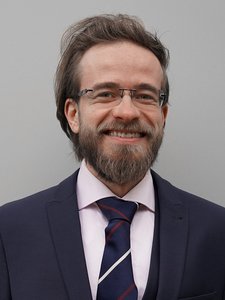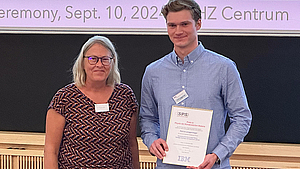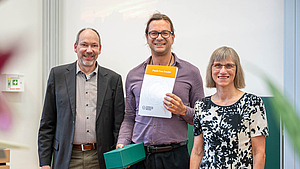
Highlights
Awards and Honors
Libor Šmejkal awarded the Walter Schottky Prize
Libor Šmejkal, group leader at the MPI-PKS jointly with MPI-CPfS, has been awarded the 2025 Walter Schottky Prize by the German Physical Society (DPG) "for his prediction of altermagnetism, a new class of magnetic order with diverse fundamental and application-oriented perspectives".
Libor Šmejkal was the first to demonstrate the phenomenon of altermagnetism. It is a new fundamental magnetic phase exhibiting a spin-polarized d/g/i-wave order in the non-relativistic band structure, thus differing significantly from conventional ferromagnetism and antiferromagnetism. Previously, the understanding of conventional ferromagnets and antiferromagnets was considered very complete, so Šmejkal's discovery came as an unexpected turn in the scientific community.
Libor Šmejkal was educated at Charles University in Prague under the supervision of Tomas Jungwirth and Jairo Sinova (Mainz), where he received his PhD in 2020. Subsequently, he headed an independent research group at Johannes Gutenberg University Mainz and, since 2024, has been the head of an independent research group at the Max Planck Institute for the Physics of Complex Systems in Dresden.
The Walter Schottky Prize is awarded by the German Physical Society (DPG) for outstanding work published within the last two years, preferably in the past year, in the field of solid-state physics by one or more young physicists. The prize consists of a €10,000 award and a certificate.
Read moreLibor Šmejkal was the first to demonstrate the phenomenon of altermagnetism. It is a new fundamental magnetic phase exhibiting a spin-polarized d/g/i-wave order in the non-relativistic band structure, thus differing significantly from conventional ferromagnetism and antiferromagnetism. Previously, the understanding of conventional ferromagnets and antiferromagnets was considered very complete, so Šmejkal's discovery came as an unexpected turn in the scientific community.
Libor Šmejkal was educated at Charles University in Prague under the supervision of Tomas Jungwirth and Jairo Sinova (Mainz), where he received his PhD in 2020. Subsequently, he headed an independent research group at Johannes Gutenberg University Mainz and, since 2024, has been the head of an independent research group at the Max Planck Institute for the Physics of Complex Systems in Dresden.
The Walter Schottky Prize is awarded by the German Physical Society (DPG) for outstanding work published within the last two years, preferably in the past year, in the field of solid-state physics by one or more young physicists. The prize consists of a €10,000 award and a certificate.
Awards and Honors
Patrick Lenggenhager receives SPS thesis award
Every year, the Swiss Physical Society (SPS) awards a few young physicists for outstanding research work during their doctoral studies. This year, Patrick Lenggenhager, who joined MPI-PKS last year as a postdoc, is the recipient of the SPS award for condensed matter physics. In his doctoral thesis, Patrick explored multigap topology and hyperbolic lattices, two emerging avenues in band theory that are tied together by the overarching concepts of symmetry and topology. His findings advance the state of the art in these two key frontiers and underscore the centrality of band theory as a tool to uncover novel physical phenomena. We would like to congratulate Patrick on this impressive achievement and celebrate his contributions to condensed matter physics, which are sure to grow even larger in the coming years!
Read moreAwards and Honors
Libor Šmejkal receives ERC starting grant
The European Research Council (ERC) has announced prestigious starting grants to researchers to set up their own teams and conduct research on the topics of their choice. One of these researchers is Libor Smejkal, a new group leader at MPI-PKS & MPI-CPfS, with his successful proposal on "Magnetic counterparts of unconventional superconductors for spin-conserved and non-dissipative electronics". The project will explore topological and quantum variants of unconventional magnets that are analogues to unconventional superfluids and superconductors. Libor's group will also search for realistic material candidates enabling low-dissipation electronics based on the unconventional magnetism. Congratulations!!
Read moreAwards and Honors
Prof. Matthieu Wyart awarded the "Physik Preis Dresden 2024"
On 18 June 2024, the French physicist Prof. Matthieu Wyart (EPFL, École Polytechnique Fédérale de Lausanne) was awarded the Physik Preis Dresden 2024. The theoretical physicist is being honoured for his pioneering contributions to various problems of complex systems, in particular the theory of financial markets, the physics of disordered and glassy systems as well as the theory of neural networks and machine learning. The Physik Preis Dresden is awarded annually jointly by the Dresden University of Technology and the Max Planck Institute for the Physics of Complex Systems (MPI-PKS).
Matthieu Wyart completed his PhD in Paris in 2005, where he worked together with J.-P. Bouchaud. During this time, he developed a model of price response functions in electronic markets, which became a standard in the industry. In the field of physics of disordered systems, he made an important breakthrough very early on by explaining how the surplus of soft modes in closely-packed systems of particles is controlled by their disordered geometry. This work elegantly solved the long-standing problem of the origin of the so-called boson peak in glasses with repulsive interactions. As a postdoc, he moved to Harvard and then Princeton before becoming an assistant and associate professor at New York University. He has been a professor at EPF Lausanne since 2015.
In recent years, Matthieu Wyart's original approaches and way of reasoning have had a strong impact and brought new insights into the physics of disordered systems. More recently, he has made significant contributions to the problem of the nature of the glass transition. In particular, his work suggests that increasing local energy barriers control the slowing down of dynamics in supercooled liquids, as opposed to co-operative effects.
The numerous original approaches to solving problems in different fields and disciplines are testimony to his extraordinary scientific excellence. In recognition of his outstanding contributions to the physics of complex and disordered systems, the Dean of the Faculty of Physics at Dresden University of Technology, Prof. Gesche Pospiech, together with Prof. Frank Jülicher, Director at the MPI-PKS, awarded the Physik Preis Dresden 2024 to Matthieu Wyart on 18 June 2024 as part of the Physics Colloquium.
The Physik Preis Dresden, endowed with 5,000 euros, was founded in 2015 by the Dresden physicist Prof Peter Fulde (1936-2024), the founding director of the MPI-PKS, and has been awarded annually to renowned scientists since 2017. The award winners are selected by a joint commission of the Dresden University of Technology and the MPI-PKS. In addition to the central criterion of scientific excellence, it is particularly important for the decision that the work of the award winners is of particular importance for the cooperation between the two DRESDEN-concept partners MPI-PKS and TUD and that their connection has been further strengthened in the long term.
Read moreAwards and Honors
Marin Bukov receives John Atanasoff Award
The John Atanasoff Award, named after the creator of the first electronic computer - the famous scholar of Bulgarian descent, John Atanasoff, was first awarded in 2003 in support of the personal achievements of young Bulgarian researchers working in the fields of informatics and information technology. Marin Bukov, group leader at MPI-PKS, is among this year's awardees ”for his outstanding contributions to the field of artificial intelligence applied to quantum technologies, and for his role in the development of efficient innovative research and education tools used worldwide”. Congratulations, Marin!
Read moreAwards and Honors
Two ERC Starting Grants awarded to group leaders at MPI-PKS
The European Research Council (ERC) has announced early-career top researchers across Europe who will receive a starting grant. The prestigious grants enable the best young researchers in Europe to build their own teams and to conduct pioneering research across all disciplines. This year, two of these grants were awarded to research group leaders at the MPI-PKS: Marin Bukov for his proposal "Nonequilibrium Many Body Control of Quantum Simulators" and Ricard Alert for his proposal "The Spectrum of Fluctuations in Living Matter". Congratulations!!
Read moreAwards and Honors
"Physik-Preis Dresden 2023" awarded to Professor Jörg Schmalian
On July 11, 2023, Prof. Jörg Schmalian from the Karlsruhe Institute of Technology received the "Physik-Preis Dresden 2023" (Dresden Physics Prize), jointly awarded by the TU Dresden and the Max Planck Institute for the Physics of Complex Systems (MPI-PKS).
The "Physik-Preis Dresden" has been established, with a generous donation by Prof. Peter Fulde, to promote cooperation between the Max Planck Institute for the Physics of Complex Systems and the Faculty of Physics of TU Dresden. It is geared towards outstanding researchers whose research is of particular interest to scientists in Dresden. This year's recipient, Prof. Jörg Schmalian, fits this condition perfectly.
Jörg Schmalian studied physics in Leipzig and Merseburg and graduated from the Technische Hochschule Merseburg in 1990. The German reunification made it possible for him to obtain a doctorate in physics in 1993 from Freie Universität Berlin under the supervision of Karl Bennemann. He stayed at FU Berlin as a postdoc before joining the group of David Pines at the University of Illinois at Urbana-Champaign in 1997. In 1999, Jörg Schmalian moved back to Europe and became a fellow of St. Catherine's College at the University of Oxford. In the same year, he accepted an offer for a tenure-track faculty position at Iowa State University, in connection with a researcher position at Ames National Lab. Jörg Schmalian quickly moved up through the ranks to become full professor in 2007. In 2011, he moved to the Karlsruhe Institute of Technology as a professor. Currently, he is the Dean of the Faculty of Physics of KIT. Jörg Schmalian has been a visiting professor at Royal Holloway University, University of Paris Diderot, and Stanford University. He has received multiple honors, among them a fellowship of the American Physical Society and the 2022 John Bardeen Prize for Theory of Superconductivity.
Jörg Schmalian is an internationally highly visible theoretical physicist with a broad range of interests. He has published over 200 research papers with over 10.000 citations. Jörg Schmalian started to work on strongly correlated electrons and superconductivity during his doctoral studies, at that time with a focus on cuprate high-temperature superconductors. He later made significant contributions to superconductivity and other ordering phenomena in iron-based and organic compounds as well as more generally on the physics of coupled order parameters. It is characteristic for Jörg Schmalian's work that he has both established conceptual foundations and modeled and predicted specific phenomena, working close to experiments. Jörg Schmalian's papers on spin-fluctuation-mediated superconductivity and on nematic order have become standard references in these fields. Moreover, Jörg Schmalian's works on quantum criticality and transport in graphene have strongly advanced the hydrodynamics of electron liquids. They were essential for identifying graphene as a readily available system in which many aspects of hydrodynamical transport can be studied experimentally. Last but not least, Jörg Schmalian has made significant contributions to the field of disordered systems. He has worked on electronic glasses and disordered magnets as well as on novel superconducting phases in models with strong disorder.
Jörg Schmalian has multiple connections to Dresden, not only to theoretical physics groups at MPI-PKS and TUD. There is also strong overlap with experimental work done at IFW Dresden, at the Helmholtz-Zentrum Dresden-Rossendorf, and by Andrew Mackenzie's group at the Max Planck Institute for Chemical Physics of Solids. This is exemplified by a new paper on strontium ruthenate with Jörg Schmalian and Andrew Mackenzie as two of the authors.
The Physik-Preis Dresden for the year 2023 honors Jörg Schmalian as an outstanding theoretical condensed-matter physicist with strong connections to Dresden and will hopefully help to strengthen these connections further.
Read moreAwards and Honors
IUPAP Medal for Frank Jülicher
Frank Jülicher shares the inaugural 2023 IUPAP Medal for the Physics of Life
The International Union of Pure and Applied Physics (IUPAP) has awarded the 2023 IUPAP Medal for the Physics of Life jointly to John J. Hopfield and to Frank Jülicher, director at the Max Planck Institute for the Physics of Complex Systems. The citation reads “For his key contributions to biological active matter physics, shedding light on the physical mechanisms that underlie cellular processes, including cooperative molecular motors; hearing; flagellar beat; active gels, fluids, and droplets; the active cell cortex; tissue growth and patterning; protein phase separation in cells; and self-organization of active surfaces.”
The IUPAP Medal for the Physics of Life is a new award of the International Union for Pure and Applied Physics (IUPAP), presented by its C6 Commission on Biological Physics every three years, at the IUPAP International Conference on Biological Physics (ICBP). The Award, consisting of a gilded medal and a certificate, recognizes outstanding achievements in Biological Physics, regardless of the country where the research has been done, the age, or the employment status of the nominee.
Congratulations, Frank!
Read moreThe International Union of Pure and Applied Physics (IUPAP) has awarded the 2023 IUPAP Medal for the Physics of Life jointly to John J. Hopfield and to Frank Jülicher, director at the Max Planck Institute for the Physics of Complex Systems. The citation reads “For his key contributions to biological active matter physics, shedding light on the physical mechanisms that underlie cellular processes, including cooperative molecular motors; hearing; flagellar beat; active gels, fluids, and droplets; the active cell cortex; tissue growth and patterning; protein phase separation in cells; and self-organization of active surfaces.”
The IUPAP Medal for the Physics of Life is a new award of the International Union for Pure and Applied Physics (IUPAP), presented by its C6 Commission on Biological Physics every three years, at the IUPAP International Conference on Biological Physics (ICBP). The Award, consisting of a gilded medal and a certificate, recognizes outstanding achievements in Biological Physics, regardless of the country where the research has been done, the age, or the employment status of the nominee.
Congratulations, Frank!
Awards and Honors
IUPAP Early Career Prize for Ricard Alert
Ricard Alert receives the IUPAP Early Career Scientist Prize in Biological Physics (C6) 2023
The International Union of Pure and Applied Physics (IUPAP) has awarded the 2023 Early Career Prize 2023 in Biological Physics to Ricard Alert, research group leader at the Max Planck Institute for the Physics of Complex Systems and the Center for Systems Biology Dresden for "revealing how new phenomena in active matter underlie a wide range of biological processes, from the spreading of epithelial tissues, to turbulent-like flows in cytoskeletal networks, to the formation of fruiting bodies in bacterial colonies".
The IUPAP C6 Early Career Scientist Prize recognizes exceptional achievements of scientists in the field of Biological Physics at a relatively early stage of their career. The recipients must be no more than eight years past the award of their PhDs (excluding career interruptions), and they are expected to have demonstrated significant scientific achievements and display exceptional promise for future achievements in Biological Physics.
Congratulations, Ricard!
Read moreThe International Union of Pure and Applied Physics (IUPAP) has awarded the 2023 Early Career Prize 2023 in Biological Physics to Ricard Alert, research group leader at the Max Planck Institute for the Physics of Complex Systems and the Center for Systems Biology Dresden for "revealing how new phenomena in active matter underlie a wide range of biological processes, from the spreading of epithelial tissues, to turbulent-like flows in cytoskeletal networks, to the formation of fruiting bodies in bacterial colonies".
The IUPAP C6 Early Career Scientist Prize recognizes exceptional achievements of scientists in the field of Biological Physics at a relatively early stage of their career. The recipients must be no more than eight years past the award of their PhDs (excluding career interruptions), and they are expected to have demonstrated significant scientific achievements and display exceptional promise for future achievements in Biological Physics.
Congratulations, Ricard!
Awards and Honors
"Physik-Preis Dresden 2022" awarded to Professor Tomaž Prosen
On May 24, 2022, Prof. Tomaž Prosen from the University of Ljubljana in Slovenia received the "Physik-Preis Dresden" (Dresden Physics Prize), jointly awarded by the TU Dresden and the Max Planck Institute for the Physics of Complex Systems (MPI-PKS). The theoretical physicist receives the award for his outstanding work on quantum mechanical many-body systems, nonequilibrium statistical physics, quantum information, classical chaos and quantum chaos.
Tomaž Prosen has authored over 200 publications on this broad range of topics, which have over 7000 citations and are recognized in expert circles worldwide. In 2016, he received a prestigious ERC Advanced Grant. The award ceremony took place at a festive colloquium in the Recknagel Building of the TU Dresden, preceded by a reception. Prof. Carsten Timm, Dean of the Faculty of Physics, gave the welcome address, and Prof. Roderich Moessner of MPI-PKS delivered the laudation.
The Physik-Preis Dresden was endowed in 2015 by Dresden physicist Prof. Peter Fulde, the founding director of the MPI-PKS. The prize winners are determined by a joint commission of the TU Dresden and the MPI-PKS. In addition to the central criterion of scientific excellence, it is particularly important for the decision that the work of the award winners is of special significance for the cooperation between the two DRESDEN-concept partners MPI-PKS and TU Dresden and that their connection has been further strengthened in the long term. The 2022 awardee, Prof. Tomaž Prosen, has a wide range of connections to the professorships at the Institute for Theoretical Physics at TU Dresden and at MPI-PKS due to his broad scientific orientation.
Read more









